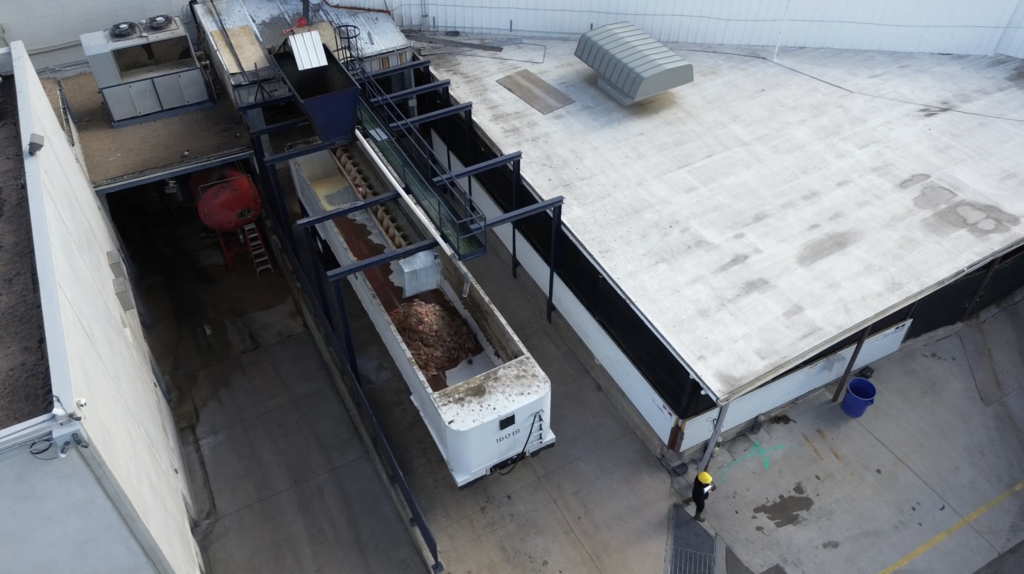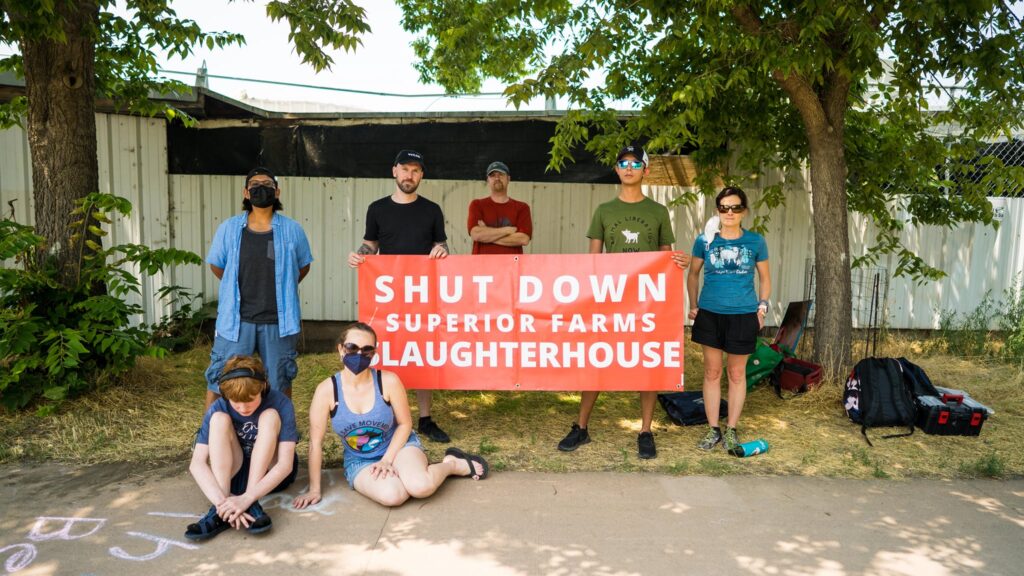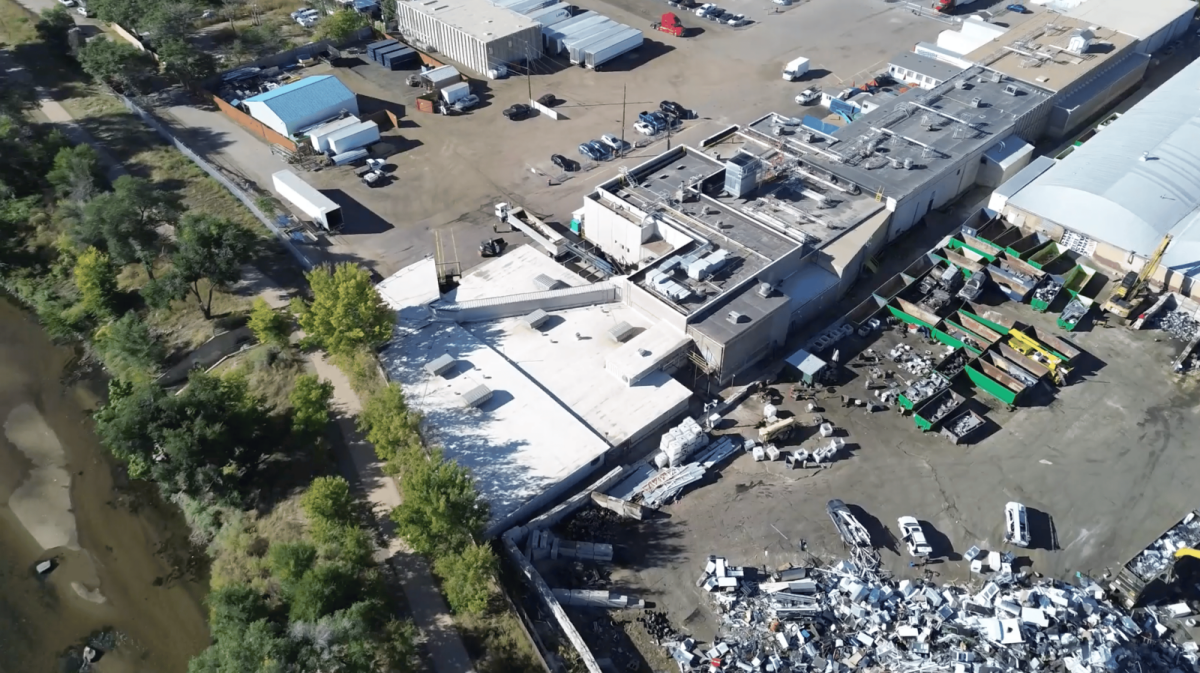As Denver residents decide whether to ban slaughterhouses in their city, environmental experts and community advocates have sparked a citywide conversation about environmental justice, water and air pollution, and the future of sustainable urban development in Denver.
If passed by voters during the 2024 Denver General Election, Initiated Ordinance 309 would prohibit slaughterhouse operations, effectively forcing Superior Farms— the largest lamb slaughterhouse in the United States, to close its doors. But the citizen-led initiative isn’t just about targeting one slaughterhouse; it’s a much-needed opportunity for voters to take control of slaughterhouse pollution in Denver and advocate for a more sustainable and healthier city for those that live there.
South Platte River at Risk: Slaughterhouse Pollution in Denver’s Waterways
The environmental damage caused by slaughterhouses is difficult to overlook. Superior Farms sits right along the South Platte River, a waterway vital to our community for both recreation and drinking water. For over 4 years, Superior Farms’ Denver facility has repeatedly violated the federal Clean Water Act, allowing harmful pollutants to seep into the riverbank.
“I saw the manure dropped out by the slaughter trucks get washed into the river when it rains,” said former slaughterhouse worker Jose Huizar, who has recently spoken out in support of Initiative 309. “A benefit of the initiative would be improving the beauty of the river. I would like to see that happen, and I’m sure a lot of people around the area would as well.”
The ordinance’s potential to improve water quality extends beyond the immediate vicinity of the slaughterhouse. Many families, unaware that the South Platte has been called “unsafe for swimming”, continue to swim and play in the river. By eliminating a major polluter, Initiated Ordinance 309 would improve public health and contribute towards cleaning up Denver’s major river. This could lead to enhanced recreational opportunities along the South Platte, benefiting the numerous public parks and bike trails that flank nearly 10 miles of the river’s course through central Denver.

Breathing Hazards: Denver Slaughterhouse Fined for Air Pollution
It’s not just the water. Air pollution has also been a persistent issue for the neighborhood surrounding Superior Farms — named the most polluted residential zip code in the United States. In fact, Superior Farms Denver has recently been fined for violations of the Clean Air Act, and the surrounding community bears the brunt of pollution from the slaughterhouse.
An EPA inspection of the Denver slaughterhouse on September 25th, 2024 revealed that the facility has been mishandling anhydrous ammonia, a chemical refrigerant. Ammonia leaks can cause serious respiratory issues, skin and eye damage, and even lung damage. Even a small leak can be poisonous, and the Globeville community has likely already been exposed. In large amounts, ammonia can contaminate water sources and pose an explosion risk. This leak was discovered in a recent inspection of the lamb-packing facility which exposed “several” violations of the Clean Air Act, resulting in $119,200 in penalties. According to the settlement, Superior Farms failed to design and maintain a safe facility to prevent chemical releases, minimize the consequences of accidental releases and appropriately assess and identify hazards.
While the lamb industry has already raised $1M on a campaign to persuade the public that the Denver slaughterhouse is a “70-year-old employee-owned business”, Denver voters should be asking themselves – is a business that has repeatedly failed to comply with federal pollution laws, putting workers and residents at risk, a business we want in our city?
Simply put, prohibiting slaughterhouses in Denver would lead to significant improvements in public safety, particularly in neighborhoods like Globeville that have long suffered from industrial emissions. (Check out the Denver Slaughterhouse Fact Sheet to discover the truth about Superior Farms’ foul play.)

Denver Ordinance 309: Paving the Way for Environmental Justice
Opponents of the Denver slaughterhouse ban argue that closing the slaughterhouse is unfair, but the real unfairness lies in what the community has had to endure for decades. For too long, the residents of the Globeville neighborhood have been forced to breathe polluted, foul-smelling air, a consequence of an industry that prioritizes profit over people.
“A lot of people say that one of the things that’s bad about Globeville is that horrible smell,” said Jose Huizar, a former employee at the Superior Farms slaughterhouse and lifelong resident of the Globeville neighborhood in Denver. “At 4:30 or 5:30, the stench of it in the neighborhood is really pungent. It smells like rotten flesh, like something dead. I know a lot of people that say, ‘I wish they would just shut down that slaughterhouse.'”
While the slaughterhouse ban won’t solve all of the long-standing environmental justice issues in this area, enacting Initiated Ordinance 309 would be a positive step forward, leading to cleaner air and a healthier quality of life for North Denver communities. We hope that Initiative 309 will inspire other organizations to start ballot initiative campaigns to regulate or prohibit other major polluters from operating in the Globeville-Elyria-Swansea region, such as Suncor Refinery or the Purina factory.
A Lethal Legacy: Factory Farms and Slaughterhouses Are Killing Us
It’s deeply upsetting that Superior Farms continues to break environmental laws and pay to pollute our city, all while benefiting from government subsidies which artificially prop up an unsustainable industry. While the impact of the Denver slaughterhouse’s pollution on residents is shocking, we need to face the truth about the slaughterhouse industry: it’s not just a local problem, but a global one. The pollution from factory farms and slaughterhouses isn’t just killing ecosystems; it’s also killing people across the country, contributing to early deaths from air pollution at a rate higher than coal plants.
But it turns out that inhaling ammonia, hydrogen sulfide, and methane is the least of our concerns. A 2018 Oxford study showed that even if fossil fuels were halted immediately, emissions from our food system alone would likely put us over 2 degrees of warming by the end of the century. That’s catastrophic warming, and we’re nowhere close to ending fossil fuels, which means that maintaining a livable planet for future generations relies on urgently moving toward a more plant-based food system.
The stark reality is that livestock emissions in Colorado have increased by 30% from 2005 to 2020, and facilities like Superior Farms still consume up to 1,000 gallons of water per pound of meat produced—a shocking amount of waste in a state increasingly grappling with droughts and water shortages.
Dayton Martindale, an environmental journalist in Boulder recently wrote in his piece published in Westword Magazine that “Closing Superior Farms would be a powerful first step toward reducing the environmental destruction caused by such facilities and would show that local, state, and federal politicians must respond to the people’s demand for a more sustainable food system.”

Initiative 309: Our Chance to Build a Cleaner, Healthier Future for Denver
As the vote on Initiated Ordinance 309 approaches, Denver finds itself at a crossroads. The measure represents more than just a ban on slaughterhouses; it’s a statement about the kind of future Denver envisions for itself.
While change often comes with challenges, the long-term sustainability benefits to Denver’s environment, public health, and quality of life that would result from shutting down Superior Farms far outweigh any short-term economic disruptions. As Denver residents prepare to cast their votes on Initiated Ordinance 309, they have an incredible opportunity to reduce slaughterhouse pollution and potentially set a new standard for urban sustainability across the nation.
It’s about time we listened to our emotions—our compassion for animals, our desire for clean air and water, our drive to protect our health and the health of our children. These are not feelings that should be shoved down in pursuit of economic growth; they are what makes us human. By voting yes on Ordinance 309, we can stand up to corporate greed, protect Denver’s most vulnerable residents, and take a significant step towards a kinder, greener future for everyone.

